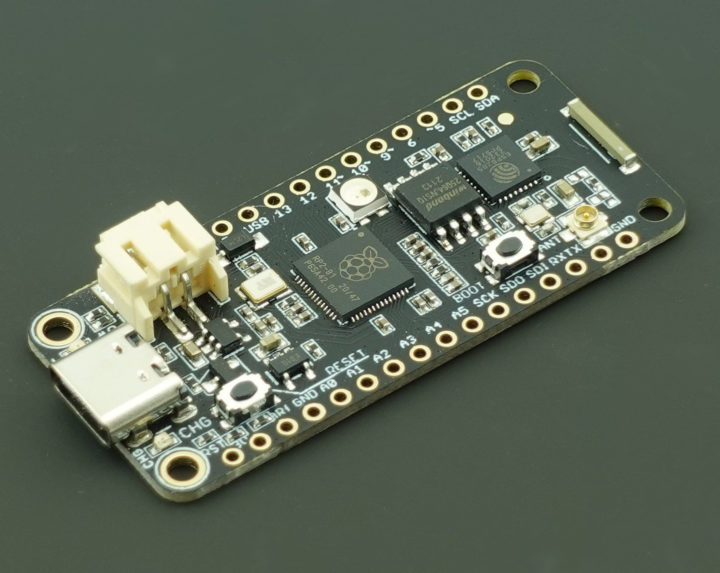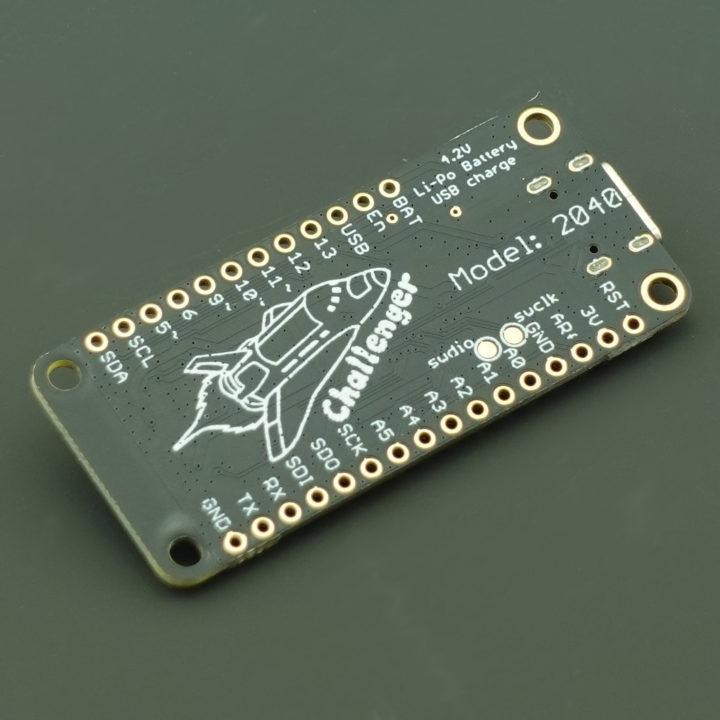We’ve already seen Raspberry Pi RP2040 getting WiFi connectivity with boards like Pico Wireless Pack, Wio RP2040 mini, and Arduino Nano RP2040 Connect in ways that do not always make technical and commercial sense as in many cases, the WiFi microcontroller (e.g. ESP32) is more powerful than the Raspberry Pi microcontroller.
But Invector Labs’ Challenger RP2040 WiFi board does make more sense, as the company combines Raspberry Pi RP2040 dual-core Cortex-M0+ MCU with an entry-level ESP8285 WiFi microcontroller, and also offers LiPo battery support, all that in the Adafruit Feather form factor.
Challenger RP2040 WiFi board specifications:
- Main microcontroller – Raspberry Pi RP2040 dual-core Cortex-M0+ MCU @ 133MHz with 264KB SRAM
- Storage – 8MB flash
- Network microcontroller – Espressif ESP8285 2.4GHz WiFi 4 SoC with 1MB on-chip flash pre-flashed with Espressif’s AT command interpreter, connected to the main MCU over UART at up to 921600 bps;
- I/Os via Adafruit Feather compatible headers
- 1x I2C, 1x SPI channel.
- 1x UART for the user (Serial1)
- 6x 12-bit ADC (Note: there’s only four on RP2040 MCU, and one on ESP8285…)
- GPIOs
- USB
- 3V, GNS, BAT, Enable signals
- Debugging – SWD pads
- Misc – Neopixel RGB LED, BOOT and RESET buttons, u.FL Wi-Fi antenna connector
- Power Supply
- 5V via USB Type-C port
- 2-pin LiPo battery connector plus LiPo charger circuit with 250mA charging current
- Dimensions – 50.7 x 22.8 x 7.2 mm (Adafruit Feather form factor)
The Challenger 2040 WiFi board can be programmed with Arduino, Micropython, or CircuitPythong, but interestingly the company does not recommend the official Arduino Core mbed 2.0 from Arduino, but instead, Raspberry Pi Pico Arduino core developed and maintained by Earle F. Philhower on Github. For WiFi support, Invector Labs recommends the WiFiEspAT library which can be found in the Arduino IDE. Documentation is somewhat limited at this time, but more details may eventually be added to the product page.
The Challenger 2040 WiFi board is sold for $14.95 on Tindie or about two dollars more than the yet-to-be-available Wio RP2040 mini, but that’s still pretty good, especially considering it supports LiPo battery charging.
Via Hackster.io

Jean-Luc started CNX Software in 2010 as a part-time endeavor, before quitting his job as a software engineering manager, and starting to write daily news, and reviews full time later in 2011.
Support CNX Software! Donate via cryptocurrencies, become a Patron on Patreon, or purchase goods on Amazon or Aliexpress






